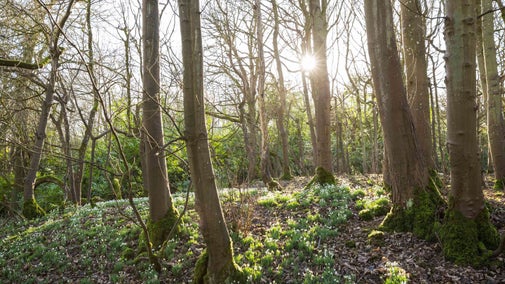
Discover more at Reigate Hill and Gatton Park
Find out how to get to Reigate Hill and Gatton Park, where to park, the things to see and do and more.

This 600-acre stretch of the North Downs offers flower-sprinkled grasslands, shady woods, dramatic views towards the Weald and the South Downs and a landscaped park designed by none other than ‘Capability’ Brown. It's great walking and cycling country, as well as a lovely spot for family picnics and games, and features numerous historic points of interest, including Reigate Fort, a modern stone circle and the site of a crashed Second World War bomber.
Gatton Park was created in the 1760s by renowned English landscape designer Lancelot 'Capability' Brown. It features sweeping vistas, copses of trees and a series of ponds winding their way down the valley to a large lake.
Covering around 600 acres, the park is managed by two trusts with the joint aim of preserving Brown’s vision. The 260 acres overseen by the Gatton Trust include the gardens, open on selected days throughout the year. The remaining 340 acres looked after by the National Trust are made up of mixed woodlands and open parkland, open to everyone, every day.
Join the North Downs Way at Reigate Hill and follow the signposts along the chalk ridge that stretches from Farnham in the west to Dover in the east. If you’re feeling energetic, you may want to tackle the walk to Box Hill where you can reward yourself with refreshments at the National Trust café.

Reigate Fort was built in 1898, one of 13 forts that ran along the 72-mile defence line between the North Downs and Essex, built to protect London from an attack by the French. Reigate Fort was used as a mobilisation centre, storing vital tools and ammunition to supply soldiers and artillery at short notice.
The site is open daily for you to look around.
On Monday 19 March 1945, an American B-17 Flying Fortress bomber crashed into the side of Reigate Hill. The clearing in the trees created by the plane is still there, along with a memorial to the nine men who lost their lives.
Reigate Hill has been at the centre of some large-scale military activities over the years. Find out more with our mile-long military history walk, which takes in Reigate Fort, the site of the crashed American bomber and a mystery wartime structure.
Discover the military history of Reigate fort on this short film. This video was produced as part of The Front Line Surrey Hills project with the Surrey Hills National Landscape, the National Trust, Gatton Trust and Surrey County Council. The project received funding for the Heritage Lottery Fund for its programme of educational and research events.
We ask for your permission before anything is loaded, as this content may introduce additional cookies. You may want to read the Google YouTube terms of service and privacy policy before accepting.

Consisting of a circle of pillars supporting a carved stone roof, this memorial on Colley Hill was donated to the Borough of Reigate in 1909 by Lieutenant Colonel Sir Robert William Inglis VD. It was built as a rather grand drinking fountain for horses but is now an ideal place for walkers to take a break and drink in the view.
The Millennium Stones is a modern stone circle created by sculptor Richard Kindersley to mark the double millennium in 2000. Placed in Gatton Park by the Jerusalem Trust, each of the 10 stones represents a 200-year period and bears an inscription from that era.
If you’re driving here, you may spot a slice of local history in the form of the disused quarries that can be seen from the A25. Reigate stone was quarried here from the Middle Ages to the end of the 19th century and used in buildings such as the miners’ cottages in Reigate.

Find out how to get to Reigate Hill and Gatton Park, where to park, the things to see and do and more.
Learn about the history of Reigate Fort in Surrey, why it was built, its military features, wartime service and how you can visit the restored building.

Learn about the tragic B-17 bomber crash at Reigate Hill during the Second World War, and the touching memorial to the nine US airmen who lost their lives.

Learn about the steps Reigate and Gatton’s forestry experts are taking to tackle this invasive fungus, while ensuring minimal impact on your visit and the local wildlife.

Panoramic views and outstanding ancient woodland

Plan a visit to one of the special countryside places in our care and discover the benefits of being in the great outdoors. Pack your walking boots and get ready to explore woodlands, valleys and rivers.

Explore the wide array of countryside settings around Surrey, from tranquil waterways to landscaped parkland, and plenty of hills to climb.

Explore some of the finest landscapes in our care on coastal paths, accessible trails, woodland walks and everything in between. Find the best places to walk near you.
